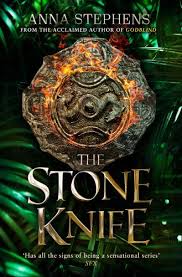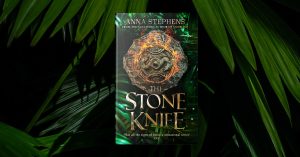THE STONE KNIFE by Anna Stephens (BOOK REVIEW)
 Anna Stephens is back with a brand new trilogy for us, and I have been so excited for it for ages. I loved her Godblind trilogy, so I pre-ordered The Stone Knife back in April ready for the November release – but when Stephens offered me an ARC for review, I jumped at the chance!
Anna Stephens is back with a brand new trilogy for us, and I have been so excited for it for ages. I loved her Godblind trilogy, so I pre-ordered The Stone Knife back in April ready for the November release – but when Stephens offered me an ARC for review, I jumped at the chance!
The Stone Knife, book one of The Songs of the Drowned, takes place in a whole new world that is inspired by ancient Central American civilisations. It is the story of the Tokob tribe as they try to survive in the face of a relentless enemy hell-bent on colonising their world, and the monsters that live in their water-sources and sing people to their bloody deaths. It is also the story of the Pechaqueh as they try to bring the magic of their leader’s Song to the tribes around them, whilst those tribes murder their gods… As one should come to expect from Stephens’ writing, things are never black or white.
The opening to this story of siren-like song magic lulls you in – it’s exposition, but it doesn’t feel like a dump as it’s a tale being woven. Natural additions of the voice’s world filter through with no background information, which gives the narrative a sense of authenticity, that this voice is rooted in its place and sings with authority. Just when we feel at peace within this tale, the voice takes a sharp juxtapositional twist in tone and it’s a strong indication of the character’s personality. And what a character she’ll turn out to be; Xessa quickly insinuated herself into my heart and is now up there with the likes of Tara and Fell Noon as one of my all-time favourite characters. Stephens brings her monsters into play promptly, we certainly do not have to wait long for the trilogy’s eponymous creatures. And they are CREEPY. And violent.
‘Mottled brown and green like the riverbed, thin ribbons of hair on its head like weed, it stretched a clawed hand towards Xessa…’
I found myself immediately convinced of their threat. Our protagonist appears adept and experienced, and yet proves to be human and vulnerable. It is a dark and dangerous opening to a story, setting the scene for what seems a desperate, eat-or-be-eaten world. It’s softened by our protagonist’s canine companion, and her reflections on her society of historians and teachers, of people with specific and individual roles to play. And so in just a few short pages, Stephens introduces us to her new world in a succinct and impactful manner.
Water was life and breath and plenty, and water was death and pain and fear, held in a balance like day and night, sun and moon. Xessa was a thief, stealing from the balance without offering anything in return except her sweat, her fear, her blood. One day, perhaps, her life.
As with the Godblind trilogy, Stephens treats us to more multiple points of views in this new trilogy – seven in total, and from either side of the conflict. Stephens is relentless in her ability to tell every side of the story and blur the distinctions between the ‘good guys’ and the ‘bad guys’, certainly more so here than with Godblind. The first three chapters, excluding the brief opener, are all from the same tribe, so when we enter into the perspective of someone who up until that point we’d been told was the enemy, I found myself thinking ah, classic Stephens… There is no right or wrong. No good or bad. We simply have people existing as themselves in their world, firm in their belief that they are in the right, that they follow the true faith. Context, as ever, is key and that is a gift for us, a step removed. This is such an accurate portrayal of humanity – that of the ‘bad guys’ not seeing themselves as being the ‘bad guys’ – and one that seems safe to say is Stephens’ modus operandi.
Speaking of representation, I had expected to come across diversity in The Stone Knife, knowing its importance to Stephens. However, I wasn’t prepared for just how perfectly Stephens embraces it here. Xessa is deaf, and Stephens shows us so many little ways in which the character processes details instead that it comes across as a very different perspective, already showing me things I would not normally have considered.
Xessa eased herself onto her feet to approach the river when a double thump like a heartbeat shivered up through the soles of her bare feet… The dog jumped again, landing back feet, front feet… his throat rippling as he barked and barked.
Treated with equal subtlety and nuance, Stephens’ approach to gender and sexuality is seamless – there are no labels used. We don’t get told the sex of a person until personal pronouns are used; no awkward, assumption-based statements like “the female warrior”. Likewise with sexuality, there is quite simply the person the character loves or is attracted to – no mention of whether they are ‘gay’, or ‘lesbian’ or ‘bisexual’, or ‘straight’. No mention of only being interested in the one or the other. No judgement. It felt so natural to read characters in this way, so refreshing. We can imagine worlds bursting with magic and fantastic creatures, or worlds lightyears away from our own, and I felt like finally I am reading a world in which love is love.
I guess what’s important to take from everything I’ve said so far is that Stephens has created a world which feels so real. So obviously a secondary, fantasy world, and yet so obviously authentic and grounded. Stephens’ writing style of threading her worldbuilding through references that are unfamiliar but obvious in their context makes for a subtle means of creating an utterly believable world.
There are a number of similarities between this world and story and that of the Godblind trilogy. Stephens’ magic system is again heavily linked to belief, faith, and ancestors. Magic is gifted through gods and spirits. As well as this, Stephens’ writing still has that visceral quality that became something of a hallmark in Godblind. You can expect violence and gore from The Stone Knife, but again, it doesn’t overpower the story. The characters are very much what drives this story, and although there may be pain awaiting them, and plenty of twists, there is still hope and love that abounds.
These similarities make this story recognisably Stephens’ handiwork, and yet this story is a clear progression of her growth and evolution as a writer. The Stone Knife is a story that you will lose yourself in, breathless in its heady depths. So many times I found myself scared to read on, fearful for what Stephens, a notorious heart-breaker, would do to these new, innocent, utterly relatable characters. So many moments, despite knowing this author’s treachery, I found myself reeling from a new revelation. This is a powerful, dark, and beautiful song, that’s left me open-armed and ready for the next.
The Stone Knife is available from HarperVoyager from November 26th 2020.
It is currently available to pre-order:
Amazon.co.uk | Amazon.com | Waterstones


[…] of: The Stone Knife | The Jaguar […]
[…] this will be a spoiler-free review, there will naturally be spoilers for book one, The Stone Knife, so if you haven’t read that, y’know, what are you even doing with your […]
To my tbr this goes, sounds amazing